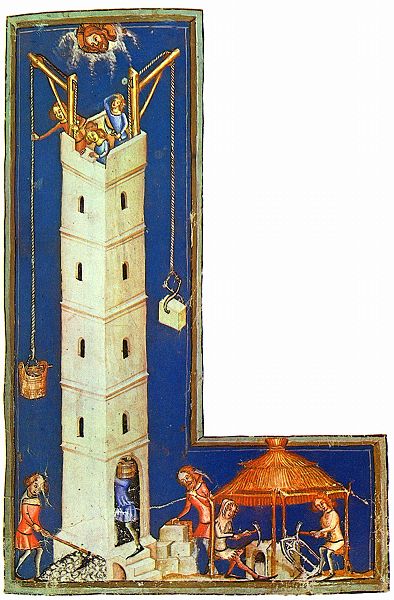
Babel/Bible
The word "Bible," of course, is not in The Bible. Wikipedia is strained on etomology suggesting Latin, then Greek derivations from the Port of Byblos where all the papyrus was exported to Greece, to mean "little papyrus book" and a usage timeline of five hundred years, dating from Hellenistic Jews using ta biblia to refer to their sacred texts in the Third Century BCE. Which begs the question of why the only "little papyrus books" in circulation at the time that ended up with the name "little papyrus book" were the sacred texts of the Jews. Kristin Swenson in Bible Babel (2010) claims that the word meant something like "little library." Which begs the question of why only certain books in the "little library" ended up being called "Holy Bibles." Which came first, the Bible or the Book? Babel derives from Babylon, which means "confusion." If bible were in the Hebrew Bible it would be spelled Bayt-Bayt-Lammed, the same as Babel. Formatively, (archeyptal) container -- (archetypal) container -- (existential-organic) movement. (Click on the Hebrew letters above for full explanations.) The Bible is a double (archetypal) container in (existential) motion/equilibrium. Thought experiment: let's say you were around a few thousand years ago, and you had some really important information that you wanted to make sure would be around a few thousand years in the future, when it might be ready to be understood by intelligent minds. Where would you put it? If you answered in the Hebrew Alphabet and the first books of the Bible, history has proven you correct. Any static container would have been destroyed or forgotten. The time-capsule of the Hebrew Alphabet was carried over thousands of years by the most adaptive and resistent container God could find: the Jews. We have seen that there is another language encoded in the Hebrew Alephabet, and another story hidden in the Torah of the Jews, the perfect place to preserve it until the end of time, or it was ready to be understood. Considering Bayt-Bayt-Lammed, the Lammed of Bible is a dynamic equilibrim (otherwise it would be destroyed and the message lost) not a static structure like a scroll or monument. But what is the Bayt-Bayt, the double (archetypal) container? It's easy to see that the Bible is a container (Bayt) for God's Word, unchanged in its form (Bayt) since 450BCE. What else could it be? But why a double container for God's Word? The Bible is a message hidden within a message designed to be persistent over millenia of time. There is a container (Bayt) for the outside (the Torah and the Rabbis) and a container (Bayt) for the inside (the Hebrew Alphabet and the Qabalah). These containers (Bayt-Bayt) are in dynamic equibrium (Lammed) and are among our oldest cutural artifacts. But the important thing to see is that Bayt-Bayt is a container for Hay-Hay, the two lives of YHWH, which clears up a lot of Babel. 
Babel | Bible Etymology | Tower of Babel | |||||||||||||||||


